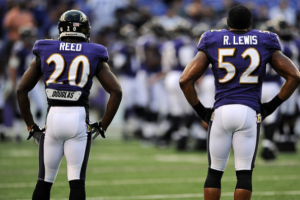The NFL, Ed Reed, and Trust
 Ed Reed is an NFL veteran defensive safety with an outstanding record of performance. But it’s not just physical prowess that gives him his edge – it’s mental too.
Ed Reed is an NFL veteran defensive safety with an outstanding record of performance. But it’s not just physical prowess that gives him his edge – it’s mental too.
And I’m not talking about toughness, or attitude, or no-pain-no-gain hype. I’m talking about insight, knowledge, and learning. Those of us in advisory or sales capacities have a lot to learn from him.
Analysis or Instinct?
Which is better: to trust your gut, or to study a situation carefully? We have heard both answers, proverbially speaking: both “don’t jump to conclusions,” and, “he who hesitates is lost.
A better answer is – it depends. On the one hand – in a crazy stock market, it’s the cool-headed trader who can recognize fundamental dynamics and make the smart move. On the other hand – in a difficult meeting, it’s the person who can sense subtle mood shifts and instinctively respond who adds the most value.
But the best answer is – both. And this is what Ed Reed embodies.
Reed is legendary for his ability to read offenses. Increasingly, it’s noted that he spends a lot of time watching opposing teams’ video tapes, something that only coaches used to do. In a recent NYTimes article, Reed is quoted as saying, “When you see something on film, just believe it. Believe that something’s going to happen, and just go.”
This is trusting your instincts. It is also putting in time in careful study. “Before you come to work, come to work,” says Reed.
What’s the relationship? It’s one of sequence. The same as what Tiger Woods’ father told him when young: Practice, practice, practice – and then, trust your swing.
Study – then react. Think – then feel. Be intelligent – then sentient.
Being Ed Reed in Your Practice
We can’t all replicate anyone else we choose to. But we can pretty much all move in that direction, if we choose strongly enough.
If you’re in sales, get a process – but don’t treat it like the end-tool, use it to inform your relationships. By all means, get Salesforce – but don’t think great CRM alone will tell you how to read the body language on your client when you’re pitching the sale. By all means do analytics on your past performance – just don’t forget to internalize the results.
(By the way, if you’ll forgive the obvious pitch: get the best of both by buying my Trust-based Selling Salesforce App, just released with Soliant Consulting).
If you’re in an advisory or consultative or coaching/mentoring role, get a model – but don’t treat it like a one-size fits all blunt instrument, use it to inform your judgment. Read Freud, and Covey, and Schein – but don’t treat your client like a final exam.
Above all, do your research in advance. The final thing you should do before going in to interact with clients and customers is to clear your mind, relax, turn on your senses. Stop rehearsing, stop repeating mantras, stop trying to motivate yourself. Step aside, and trust your swing.
Being Ed Reed in Life
As I read up on Ed Reed for this blogpost, I couldn’t help but notice what people say about his personality. A particularly good piece is Ed Reed: Hiding in Plain Sight, by veteran ESPN sportswriter Kevin Van Valkenburg.
What emerges is the portrait of someone who has native intelligence, but who is also deeply empathetic. Comfortable in his own skin, not seeking the limelight. Someone who leads by attraction, not promotion. Someone who has the personal comfort level to feel the equal of his coaches, as well as humbly one of the team of players.
And while this post is just about the link between cognition and instinct, I can’t help but believe that link is greatly strengthened by his overall emotional make-up.
In so many ways, Descartes had it wrong when he said cogito, ergo sum. So often, it’s como sum, como cogito. (In case my Latin is faulty, that’s meant to say, “As I am, so do I think”).

Leave a Reply
Want to join the discussion?Feel free to contribute!